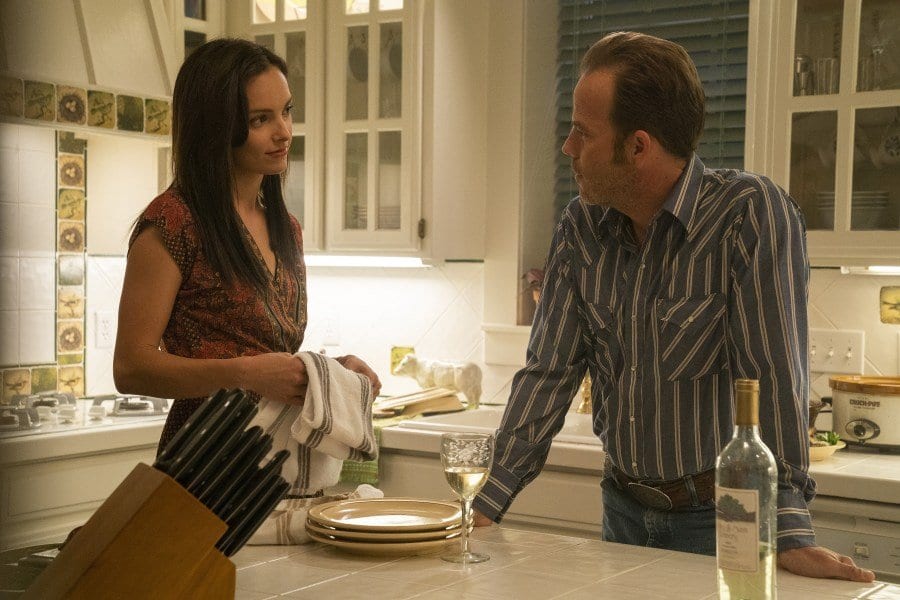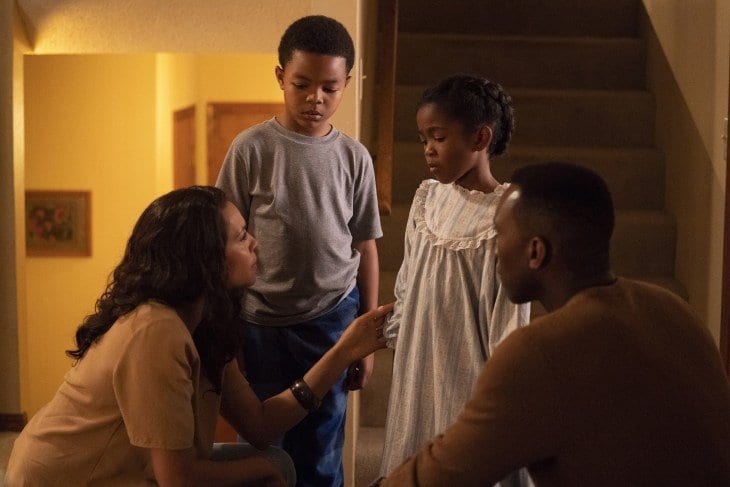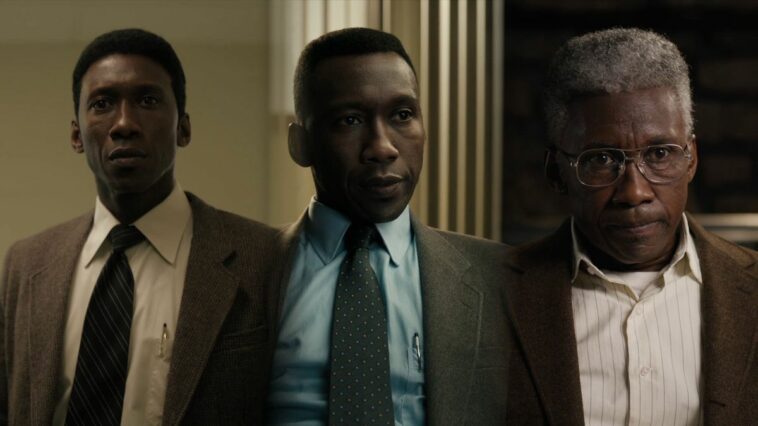True Detective Season 3 is not Season 1, the sequel. There’s no Yellow Kings, no “time is a flat circle,” no elements of American Gothic cult-like behavior. It’s different, it is its own story while at the same time being a “return to form” after Season 2 notoriously fell off the tracks. Season 3 does have a compelling mystery but it’s more than that. Season 3 has offered us a story that touches on very real cultural issues in American history, wrapped inside a mystery but layered with a very real tale about coming to the end of one’s life and wanting to take care of unfinished business before you die. It’s a concept we all can relate to because we’re all going to die one day. No, this isn’t Season 1, but it’s time we quit comparing the two and realize exactly how powerful of a narrative with top-notch acting we have on our hands here.
The fifth episode, titled “If You Have Ghosts,” went a long way in terms of pushing the story forward. We found out Brett Woodard was the one who took the fall for the Purcell children’s kidnapping / Will’s murder. We learned that things got really bad between Hays and West in 1990 and it sounds like someone else died, with Lucy Purcell’s creepy cousin Dan still being the obvious guess. We learned that in 1990, Julie Purcell wants nothing to do with her father and seems to blame him for what happened to her and Will. We learned that Roland’s life turned into one of solitude and booze, presumably after the events of 1990. We also learned that Amelia’s book was something Wayne really should’ve read a long time ago and figures to be a big part of the story moving forward. We also learned that Hoyt, founder of the Ozark Children’s Outreach Center and Hoyt Foods (where Lucy Purcell once worked), paid a visit to Wayne in 1990, which adds to previous speculation that he was perhaps after Julie in an attempt to give his wife a daughter to replace the one they lost. While these were all big steps in advancing the story, there are still many questions left to ask as we the detectives at home try to piece together this case.

Last week ended on a cliffhanger, with the local hillbillies chasing Woodard back to his home, which was packed with explosives, trip wires, and the numerous guns at his disposal. Woodard was very much back in a war state of mind and this episode showed us exactly how lethal this confrontation was. Explosives were detonated and many shots were fired. The local men were all taken out and so were some of the FBI agents who were in town working on the Purcell case. West took a bullet to the knee, explaining the limp we see him walk with in 1990 onward. Hays made it into the house and got the drop on Woodard, leading to a conversation between the two Vietnam vets. Here we got to see how broken Woodard was and how this was ultimately a way for him to end his life and his suffering. Woodard wanted to die and he chose Hays, a fellow soldier, to be the one to end his life. As if Hays didn’t already have enough ghosts, now he can add Woodard to the list.
In the 1990 timeline, we learned that Woodard was posthumously convicted of the kidnapping of the Purcell kids and Will’s murder. Hays, while looking at crime scene photos, comes to the determination that the evidence found at Woodard’s house (clothing of Julie’s and Will’s backpack) was planted there, which seems to be true. The big thing that stuck out to me here was when West tells Hays that he was stuck behind a desk for the past ten years for not falling in line with the higher ups. Could this mean that Hays disputed Woodard’s guilt even back in 1980 and West didn’t back him?
Another major scene from the 1990 timeline was when Tom Purcell was brought in to hear a recording of his daughter Julie calling the police department. In her message, Julie repeatedly says she wants her father to leave her alone and is blaming him for what happened to her and Will. She also doesn’t seem to know that Will is dead. A few thoughts on this: first, it would seem that there were two adults in the woods with the Purcell kids that day in 1980. (Could this be the black man and white woman who were mentioned by the man who lives in the woods?) One adult took Julie, probably without force as it seems like the kidnappers had developed a relationship with the children prior to this day. The other adult killed Will, either because they didn’t want him or because he put up a fight. Another observation is that Julie’s blaming of her father should make us want to suspect him, but my guess is that she’s suffering from Stockholm Syndrome and her captors blamed her father for her unhappy home life. This would also fall in line with her mother having a part in them being taken. Lucy gave them up to Hoyt (or someone else) so the captors portrayed her as the good parent and assigned Tom all of the blame.
Wayne and Amelia’s relationship was once again prominently featured this week in both 1980 and 1990. In 1980, Amelia rushed to the hospital the night of the incident at Woodard’s home. After Wayne tried to push her away, he wound up going home with her and they slept together for the first time. In 1990, we saw them at Roland’s new home with his girlfriend—the same woman he was hitting on at the church in 1980 in last week’s episode—where they awkwardly fought about Amelia’s obsession with the Purcell case. The fight continued when they got home and the line that stuck out the most to me was when Amelia said that Wayne uses the case as an excuse to not be home and part of his family. My current theory is that after the events of 1990, Wayne quits being a police officer in an attempt to save his marriage and heal his family. How successful it was I don’t know, but it obviously didn’t bring him the personal closure he can only get by solving this case.
In 2015, we see Wayne sitting alone, reading his deceased wife’s book. When he gets to the part about Amelia’s visit with Lucy in 1980, he makes the connection that the note sent to the house also references how children should laugh, which is what Lucy said to Amelia. To Wayne, this is a clue that Lucy sent the note as a way for Tom to try and move on. It’s also further evidence in my opinion that Lucy was in on the kids’ abduction. Seeing how excited Wayne was to get this information from his wife’s book seems to indicate that the book will be frequently referenced moving forward. It’s a great narrative choice to have a way for his wife to continue to help him from beyond the grave, while Roland helps him with the gaps in his memory, so the two most important relationships in Wayne’s life can be equally impactful here on his quest to finally close the Purcell case for good.

The episode ended with Henry taking Wayne to see his old partner. We learned that Wayne quit the police force in 1990 and hadn’t spoken to Roland since. Roland is defensive about his drinking, never married the woman from 1990, and seems quite content “wasting time.” He wants to be alone, despite having always been a “people person,” as Wayne described him to Henry. What happened to Roland in 1990 to take him off his promising career path and a seemingly bright future with a woman he appeared to really care about and make him a drunken recluse? I keep coming back to Tom Purcell. We’ve seen that Roland has really taken an interest in helping him in both 1980 and 1990. He cares about the guy. Is Tom falsely accused of the crimes in 1990? Could be, but Tom is a very fragile man, driven by emotion, and he’s lost it all. It would not take much to push him over the edge and either drive him to kill someone he suspected of hurting his family or to take his own life. Either of those outcomes would be incredibly damaging to Roland and could start him on a path leading to where we see him in 2015.
The ending of this episode, even more than being about the case and connecting the dots, was showing us that this season is about these two men trying to find closure in the latter years of their lives. The Purcell case ruined them and now here they are—Roland drunk and alone and Wayne alone and battling dementia—together again, wondering if they can do things right this time. Can they face their ghosts and live out their final years free of the burdens this case brought them? That remains to be seen, but in a day and time when ageism is a highly discussed topic in Hollywood, True Detective is telling a story about two older men, facing not only the wreckage of their past but also the reality of their own mortality in both a respectful and compelling manner. No, this isn’t revisiting the magic of Season 1, but it is something unique and thus far has been an incredibly powerful story that I can’t wait to see fully unfold.


This is the episode where S3 finally stepped out of the long shadow of S1 and became it’s own story.